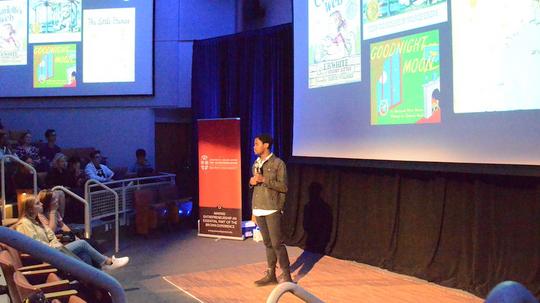
Thirteen startups presented last week at the Breakthrough Lab Venture Showcase hosted by Brown University’s Jonathan M. Nelson Center for Entrepreneurship.
The B-Lab is an intensive eight week accelerator program that supports student entrepreneurs developing high-impact ventures by providing students access to high-level sector specific mentoring, business and technical support, focused programming and dedicated space.
“Entrepreneurs benefit from their experience at Brown because when you chart your own course ... you define your own path," Michael Kaplan, co-founder of Fashion to Figure, Brown University Class of 1995 and a B-Lab mentor, said during opening remarks. “If any alumni are out there on video stream or in the audience, I would encourage you to do anything associated with this university. I gained far more than I gave in the mentoring experience this summer.”
Here are the first six startups that presented at the event. Be sure to catch the remaining startups in part two of this post.
EveryWear EveryWear was born after the founders met a woman named Judy, who is bound to a wheelchair. Judy wants clothes that not only fit well to meet her functional needs, but look good for her symbolic needs as well. The company is an apparel experience that will make novel clothing products that embrace the more inclusive elements of the needs of those that fall outside of the bell curve “norms” that have historically dictated garment construction.
EveryWear also aims to create an e-commerce marketplace that is welcoming to the diversity and spectrum of health and disability experienced by just about everyone.
“Most sites for wheelchair [amputees] lack the edgy feel the fashion industry is known for,” said Co-Founder Krystal Sarcone. The company is planning to target working women who seek business-appropriate and professional wear. EveryWear plans to make money by collecting commission for dropshipping and through advertising and promotional fees.
Intellibell Due to competition, supermarket owners are only likely to make 1 to 2 percent profit on their produce. In fact, most supermarkets are losing half a million dollars every year on produce. If you ask Pavlo Lyalyutskyy, the reason for this is because the software programs supermarkets use to predict inventory are out of date.
His company, Intellibel, aims to fix this with a better software management platform that looks at factors well beyond past sales to make inventory predictions. Lyalyutskyy’s platform incorporates metrics such as weather conditions, events and holidays, social media trends and consumer psychology, just to name a few.
“People are very disinterested in lettuce except when there is a Salmonella outbreak,” he said. “People are making very big claims about certain foods that are impacting sales. Kylie Jenner commented on milk [on social media] and milk sales were up the next day.”
Things like this are impacting produce sales and Lyalyutskyy thinks his software can remedy the problems grocery stores are facing. Intellibel plans to launch by partnering with grocery stores in New England. He said the company plans to charge $2,000 per month, but grocery stores can expect $6,000 per month in savings from using Intellibell software.
Parallel Market Uber, PricewaterhouseCoopers and Fidelity Investments. Some of the largest, most profitable companies in the world today are still private, meaning that shareholders are wealthy on paper, but cannot liquidate that wealth into actual money. This could soon change if Rhaime Kim brings her company to fruition.
Parallel Market would serve as an exchange, where investors could use tokens to exchange their private shares to people who want stock in large private companies.
“Shareholders such as employees are wealthy on paper but it’s all tied up,” said Kim. “But you have other investors who would love to invest in these companies. There is the secondary market, but this market is very inefficient ... leaving money on table.”
Employees of private companies would be able to exchange their private shares for tokens using Parallel Market, which would then sell those shares to investors. Investors would pay a transaction fee to Parallel Market, part of which would go back to the original shareholder. The collective valuation of private unicorn companies in the U.S. is $718 billion. The company would charge a liquidation fee of 5 percent and a 3 percent transaction fee to sellers and buyers. Kim has already developed a prototype and is looking to partner with mentors and securities lawyers.
Koi Prosthetics There are 40 million amputees in the world, but only 5 percent will have access to a decent prosthetic and that number is only expected to get worse. Prosthetics, which are typically very expensive, are composed of several parts including the socket, knee, pylon and foot. The socket is one of the most expensive parts because it requires a molding process to construct it.
Koi Prosthetics intends to reduce the costs of prosthetics by making a universal socket that removes this molding process. The socket will also be able to adjust to account for changing conditions such as if a person’s leg or knee is swelling. Co-founder Matthew Borges said the company plans to sell directly to hospitals and would like to start building its network in Vietnam and Southeast Asia.
Toreva Toreva is an independent publishing company that makes picture books that are representative of a diversity of African cultures, languages and people.
“It is important for kids to not only see themselves in books, but to get better understanding of what their language looks like,” said Co-Founder Kelechukwu Udozorh. “Once they understand that, they can better understand who they are.” The company plans to start by focusing on printing books in the 15 languages spoken in Zimbabwe.
Dialogue Africa Africa is a continent that consists of 1.3 billion people who speak over 1,500 languages. But the three big language-teaching platforms — Rosetta Stone, Duolingo and Babbel — only teach three of those African languages, none of which are spoken in sub-Saharan Africa.
Dialogue Africa seeks to change this by creating a platform that teaches different African languages through fun, engaging and easily digestible lessons.
“You won’t learn Twi (an African language) like you’d learn French, and the software should reflect that,” said Co-Founder Shannon Frampton.
The global language tech market was worth $43 billion in 2017, a number that is expected to grow $4.5 billion over the next four years. The company plans to use a subscription business model and target families abroad, expatriates tourists, diasporans, businesses and government organizations.
Editor's Note: Dialogue Africa Founders Shannon Hampton Joey Genfi were named to Rhody Inno's 25 Under 25. Read more here.








